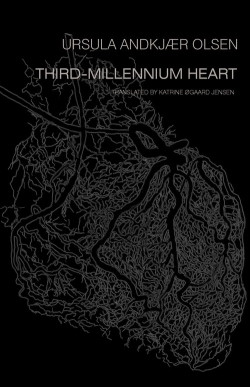Third-Millennium Heart
by Ursula Andkjær Olsen, translated by Katrine Øgaard Jensen
reviewed by K. B. Thors
Sometimes nails are hit on the head before we realize what is under construction. Particularly in times of epochal shift, voices emerge from the crowd, articulating our apprehension and drawing the curtains back. Things are Named—Castle, RED, State, wagon. If the novelty isn’t in the phenomena themselves, perhaps it resides in the calling-out.
Third-Millennium Heart, the eighth collection of poetry by Danish poet Ursula Andkjær Olsen, is a bell ringer. Ingeniously translated by Katrine Øgaard Jensen, this jolt of a book is reminiscent of The Waste Land in its earnest concern and foreboding satire. The poems occupy a triptych of our contemporary precipice—the edge peered over, the fall/zero gravity float, and the gaze back at the former home. From a distance established through sparse text and guttural truth, Olsen, through Jensen’s imaginative feats of translation, confronts us with an unsparing, lucid world view.
humans, animals, gods
work, loneliness
babel and ivory
[ … ]
I handle my pain
like an adult human being, I do nothing.
Co-published by Broken Dimanche Press and Action Books, Third-Millennium Heart adds to Olsen’s history of poems, libretti, and dramatic texts. Awarding the book with the prestigious Danish Montana Literary Award, the judging committee stated that it “heavily underlines the fact that Ursula Andkjær Olsen possesses one of the wildest and sharpest intellects in Danish contemporary poetry.”
In the face of frightening rhetoric and blanket political denial, it is a chilling boon—particularly for American readers—that foreign fingers are taking a coherent pulse of movements that are as intimate as they are global. The future is grounded in a recognizable world, but it doesn’t feel like anything is pumping:
their chamberless heart named Nameless
incapable of beating:My name is Waiting Room.
I am allowed to be upset here.
I have to be upset here.
I cannot get out of here until I’ve been upset.
The poems are arid, charade-outing, third-millennium sentiment—vacuum-like space is part of the book’s precision. Rhythms progress in the space hollowed out around the words. In the translator’s note, Jensen describes her use of line breaks to simulate multivalent Danish grammar, and the space in the poems is certainly effective. Echo and chamber are scoured out around the reader, leaving us to talk amongst ourselves.
On a regular plane, the mood would be clinical. As is, a feeling of transport captures the blown-out, effaced life forms we may have already become.
[ … ] the fluid is pushed back
into my tear ducts and I can lie like this, a closed orbit, mute jubilation,
fountain, for several thousand years.
Satellite or sarcophagus? Olsen and Jensen put us in both. Bodies and interactions are rote, with encyclopedic explanations in hindsight: “Culture is necessary = nature is a luxury / humans cannot afford.”
There is always a speaker; a universal and threatening individual. Is it the heart? The awareness of what we have become but cannot face? The “She” or “They” whose voice we read calls to mind Spike Jonze’s ScarJo, a removed Her illustrating our sick patterns while floating above them. As the reader begins to ask why these questions haven’t come up sooner, self-deprecation snaps back to the human. Line breaks put our circuit board under the microscope:
driving by in my fuck-you wagon [ … ] with something to cover it
a new language
a new pacifier.
There’s no intimation that our intelligence has helped us become fitter, happier, or more productive. Rather, our growth has magnifies our selfish nature: “That’s how great I am: my pain has nothing to do with me.”
A biological sensibility merges with the fact that conservation depends on a fixed state. “All selection is natural,” proclaims Olsen:
Refusing to be a victim is failing to see supremacy
for what it is: supremacy. The goal, deliver the victim as polished and
hog-tied as possible to my distant interior.
Jensen’s adaptations of Olsen’s compound words make for thrilling pairings: “I am in comajubilation: no feeling can reach me here.” We also meet “paranoia-carcass” and “sweat-embroidery.” The darkness calls to mind Poet in New York, terrible and harsh, sloughing modern gender on a hunt for folk sensuality. “Me, you, castles, towers … I wash / my contact areas in the moon.” Prometheus meets production with a dash of cogent personability: “We rub against each other: thus fire is created every day … I am not telling anyone how to feel.”
Language is the scaffold, the rebar of lonely edifice. The heart is incubation space for suckling-society, the political mammal: “Mother Market’s lover-me-lover-me-not dances with the food / chains of the world in its hair.”
As the book peaks, terms get explicit: “State father lawfulness civilization vs. nature mother freedom subversive.” The binary “vs.” may be a hallmark of earlier times, except so much and not much has changed. Dipping into flow charts and saturated tissue, we’re left with an all-at-once, unnerved temporality: “All blood is equally old; only our hearts become newer and newer / catacombs.”
Third-Millennium Heart is a blunt force read where confession meets capillary, best experienced for oneself. As Olsen puts it, “No contact area should go to waste.”
Published on December 5, 2017

